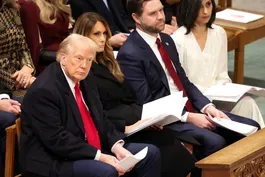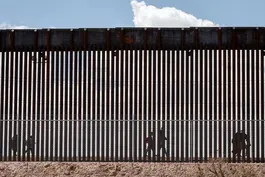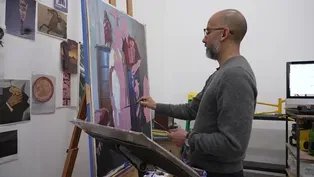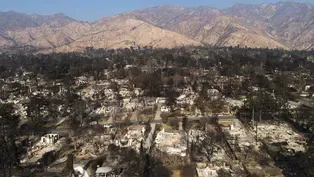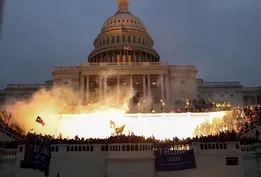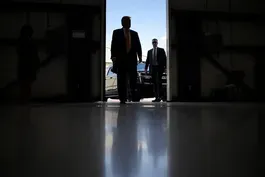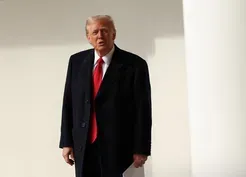
Why Trump withdrew U.S. from World Health Organization
Clip: 1/21/2025 | 5m 23sVideo has Closed Captions
The potential impacts of Trump's decision to withdraw from the World Health Organization
As part of his blitz of executive orders, President Trump delivered on a promise to withdraw the United States from the World Health Organization. The Trump White House accuses the WHO of mishandling the COVID-19 pandemic and bias toward China. Amna Nawaz discussed potential implications with Lawrence Gostin of the O'Neill Institute for National and Global Health Law at Georgetown University.
Major corporate funding for the PBS News Hour is provided by BDO, BNSF, Consumer Cellular, American Cruise Lines, and Raymond James. Funding for the PBS NewsHour Weekend is provided by...

Why Trump withdrew U.S. from World Health Organization
Clip: 1/21/2025 | 5m 23sVideo has Closed Captions
As part of his blitz of executive orders, President Trump delivered on a promise to withdraw the United States from the World Health Organization. The Trump White House accuses the WHO of mishandling the COVID-19 pandemic and bias toward China. Amna Nawaz discussed potential implications with Lawrence Gostin of the O'Neill Institute for National and Global Health Law at Georgetown University.
How to Watch PBS News Hour
PBS News Hour is available to stream on pbs.org and the free PBS App, available on iPhone, Apple TV, Android TV, Android smartphones, Amazon Fire TV, Amazon Fire Tablet, Roku, Samsung Smart TV, and Vizio.
Providing Support for PBS.org
Learn Moreabout PBS online sponsorshipAMNA NAWAZ: As part of his blitz of executive orders issued yesterday, President Trump also delivered on a campaign promise to withdraw the United States from the World Health Organization.
The White House accuses the who of mishandling the COVID-19 pandemic, bias towards China, and says the U.S. is forced to pay more than its fair share to support the international organization.
For more on the potential implications of this, we're joined now by Lawrence Gostin, law professor and director of the World Health Organization Collaborating Center at Georgetown University.
Lawrence, welcome back.
Thanks for being with us.
In your Washington Post op-ed today, you said leaving the WHO would be what you called a grave mistake that would hurt Americans.
How so?
What's the potential harm here?
LAWRENCE GOSTIN, Georgetown University: Well, thank you for having me.
I believe this is a truly historic decision.
The United States really formed the World Health Organization in 1948, and has been its most influential and greatest funder for 75 years.
This is going to make America decidedly less safe, less secure.
And it's hard for me to think of any national advantage that we get.
I only see us alone and isolated, not stronger.
AMNA NAWAZ: You mentioned the U.S. has been its greatest funder for WHO.
If you take a look at this graphic, we should just point out, look at the top 10 sources of funding there, the U.S. there at the top, but there's other groups like the World Bank, the Gates Foundation, countries like Germany, U.K. and Japan.
But the U.S. is responsible for someone-sixth of the organization's budget.
So is President Trump's characterization that the U.S. is shouldering an unfair financial burden here wrong?
LAWRENCE GOSTIN: Yes, actually, I think it is wrong, but it's not totally wrong.
Let me explain.
The WHO has a budget of roughly one-quarter of the U.S. CDC.
So, for a global institution, it's chronically underfunded.
It doesn't have the resilience and funding that it needs to put out fires all over the world.
So the United States shouldn't pay less, but other countries should pay more.
China should, India, the Gulf states, many other middle-income countries.
So I think that Trump would do a much greater service to the United States and the world if he stayed in and he negotiated a deal.
Yes, let's make WHO more resilient.
Let's fund it better.
Let's make it more powerful and let's make it more accountable with financial oversight.
But leaving it would gravely damage United States' national interests and world health writ large.
It's not really like the border, where you can kind of seal off the Mexican border so that you can stop immigrants.
Germs don't know borders.
And a United States without WHO is a United States alone and isolated and more fragile and vulnerable.
AMNA NAWAZ: Pulling out of the organization means that the U.S. would lose access to the World Health Organization's global public health data too, which you said would leave agencies like the CDC flying blind.
Help make that real for us.
What is the potential harm that you are worried about?
LAWRENCE GOSTIN: I see this as the greatest self-inflicted wound that this executive order has put for us.
I mean, it is a grave wound to WHO, but I think it's a more grievous wound to the United States.
Here's why.
The World Health Organization leads a vast network of public health agencies, laboratories, and international scientists that constantly track novel outbreaks and shares data.
Without that, CDC doesn't have an early warning.
We can't respond.
And so we're weaker.
We're less prepared.
But here's more.
And I think it's really important.
Our pharmaceutical industry, the NIH, needs these data to develop vaccines, therapies, and other lifesaving tools that we rely on.
If you remember back to COVID-19, and Operation Warp Speed, and Trump gets a lot of credit for that, we were in front of the line for vaccines.
We may be near the back of the line because we're not going to get data about how these viruses are evolving, what we can do to respond to them and create vaccines.
AMNA NAWAZ: Lawrence Gostin, thank you so much for joining us tonight, professor and director of the World Health Organization's Collaborating Center at Georgetown University.
Thank you.
LAWRENCE GOSTIN: Thank you.
GOP senator surprised by 'blanket pardon' of Jan. 6 rioters
Video has Closed Captions
GOP senator surprised by Trump's 'blanket pardon' of Jan. 6 defendants (2m 54s)
The immigration policies that led to today's complex system
Video has Closed Captions
A look at the history of U.S. immigration policies that led to today's complex system
'Just a Dream' offers glimpse of tragedy and triumph of life
Video has Closed Captions
'Just a Dream' offers glimpse of tragedy and triumph of life in contemporary America (7m 8s)
News Wrap: American Ryan Corbett released from Afghanistan
Video has Closed Captions
News Wrap: American Ryan Corbett released from Afghanistan in prisoner swap with Taliban (5m 3s)
Remembering the victims of the deadly Los Angeles wildfires
Video has Closed Captions
Remembering the victims of the deadly Los Angeles wildfires (3m 2s)
Riggleman weighs in on Trump’s pardon of Jan. 6 rioters
Video has Closed Captions
Former Rep. Riggleman weighs in on implications of Trump’s move to pardon Jan. 6 rioters (7m 7s)
Trump administration setting stage for mass deportations
Video has Closed Captions
How the Trump administration is setting the groundwork for mass deportations (6m 18s)
Trump issues wave of executive orders in policy overhaul
Video has Closed Captions
Trump unleashes wave of executive orders in promised overhaul of U.S. policies (4m 35s)
Providing Support for PBS.org
Learn Moreabout PBS online sponsorshipMajor corporate funding for the PBS News Hour is provided by BDO, BNSF, Consumer Cellular, American Cruise Lines, and Raymond James. Funding for the PBS NewsHour Weekend is provided by...

